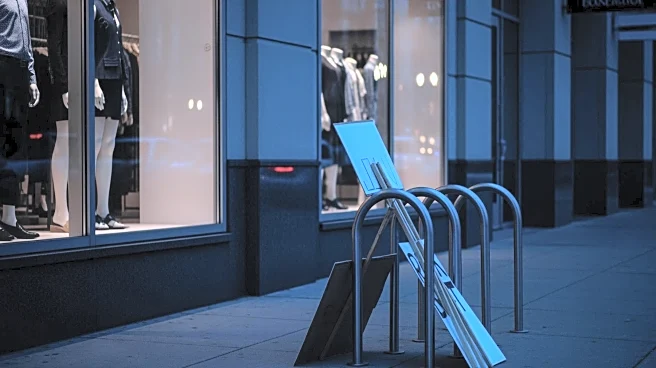What's Happening?
Edeline Lee has presented her Spring 2026 Ready-to-Wear collection, showcasing a series of designs inspired by the whimsical elements of a traveling circus. The collection features innovative pieces such as pale pink and mint circle skirts with hoop inserts, ruffled collars, and sequined columns. Lee's approach marks a departure from her previous theatrical presentations, opting instead for a traditional runway format. This shift emphasizes the narrative power of the clothing itself, as Lee aims to challenge assumptions about her design style. The collection also includes Lee's first venture into knitwear, featuring sustainable FSC viscose panels, highlighting her commitment to British manufacturing.
Why It's Important?
Edeline Lee's latest collection underscores the evolving landscape of fashion design, where sustainability and local production are increasingly prioritized. By choosing to manufacture her knitwear in Britain, Lee advocates for the support of local industries, which could influence other designers to follow suit. Her circus-inspired designs also reflect a broader trend in fashion towards playful and imaginative aesthetics, potentially impacting consumer preferences and market trends. Lee's decision to focus on the narrative power of her clothing may inspire other designers to reconsider the role of storytelling in fashion presentations.
What's Next?
As Edeline Lee continues to innovate, her commitment to British manufacturing may encourage further investment in local production facilities, potentially revitalizing the domestic fashion industry. The reception of her Spring 2026 collection could influence future design trends, particularly in the realm of sustainable and narrative-driven fashion. Lee's exploration of knitwear may lead to expanded offerings in future collections, providing consumers with more versatile and eco-friendly options.
Beyond the Headlines
Lee's emphasis on 'Made in England' highlights the cultural significance of supporting local craftsmanship, which may resonate with consumers seeking authenticity and heritage in their fashion choices. This focus on local production could also spark discussions about the ethical implications of global manufacturing practices, encouraging a shift towards more responsible and transparent supply chains.











